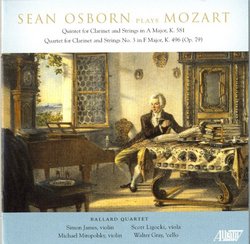American Record Guide review
Feanor | 12/02/2008
(5 out of 5 stars)
"American Record Guide, November/December 2008
Patrick Hanudel
The task of reviewing clarinet discs inevitably leads to an over-familiarity with the "classics" of the repertoire, as most clarinetists who think they are worth their salt cannot resist putting their own stamp on them. Every now and then, however, one of them makes this "task" a supreme pleasure. Here, former Metropolitan Opera Orchestra clarinetist and University of Washington faculty member Sean Osborn and the Ballard Quartet, a group of Seattle-area string players, present an all-Mozart program. The Quintet is always a good lead-off, and Osborn and the quartet hook the listener right away with their beautiful sound, polished technique, great teamwork, perfect balance, and superb musicianship. They understand the music well beyond the notes; they respect the classical framework, but they speak with Mozart's romantic voice. The group not only plays with soul, but they know when to have fun.
The ensemble finishes with the last of the three "quartets" that have sparked intense debate in musicology circles. In 1799, the young German composer Johann Anton Andre visited Constanze Weber, Mozart's widow, bought the composer's musical papers, and brought them back to his father's publishing house in Germany. In the early 19th Century, the Andre firm became a leader in the printing and distribution of Mozart's works, and while their efforts have not stopped scholars and editors from fussing over the composer's scores, the did much to secure Mozart's deserved posthumous reputation.
Among the works issued by the Andre firm are three quartets for clarinet, violin, viola, and `cello, collectively titled "Opus 77", that are actually arrangements of earlier chamber works. Some clarinetists feel that the arrangements could only be the work of the master, but others have doubts; and in the liner notes Osborn discusses the matter and gives his opinion. The Quartet No. 3 in F performed here is a re-organization of the Trio in G, K 496. It's not quite on the level of the quintet, which has more gravitas and sublime moments; but Osborn, James, Ligocki, and Gray give a convincing rendition, and it sparkles. Clarinetists will enjoy Osborn's lovely timbre, clean technique, amazing soft playing, and faultless phrasing. Non-clarinetists will simply enjoy some wonderfully played chamber music."


 Track Listings (2) - Disc #1
Track Listings (2) - Disc #1

